Two years ago, we conducted a survey of authors and wrote about what authors making over $100k per year were doing. We know that many authors use those findings to inform their strategy, so we conducted a similar survey again this year. This article outlines our findings and how to use them to increase your author income.
We break down the results into three segments of authors:
- Emerging Authors – Authors who have never made more than $60k in a year from book sales
- 60kers – Authors who have made over $60k in a year from book sales
- 100kers – Authors who have made over $100k in a year from book sales
In this post, we will dive into the differences between these three groups, and what those differences tell us.
Even if making money from your writing is not a primary goal, these findings can help you focus your efforts. For those authors who are writing as a business, these findings can be invaluable in helping you set your goals and identify what works.
On Writing
Finding #1: The number of books in your catalog matters to your author income. A lot.
The more books you publish, the more money you make. Looking at the medians, Emerging Authors have 6 books in their catalog, 60kers have 22 books in their catalog and 100kers have 28 books in their catalog.
Each additional book you publish adds to your revenue each month. Authors making over $60,000 aren’t doing so by publishing a few expensive books, they are building a catalog that builds their author income over time.
How to level up:
- Plan to publish more books.
- Set an attainable goal for yourself and once you reach it, set a new one.
- Know that every book published will add incremental revenue to your author income.
To quote one 100ker, “Write. No, seriously: WRITE.”
Publishing more books isn’t easy, and don’t plan on doing it overnight. Just know that when you do publish another book, it is a great thing for your author earnings.
Finding #2: Time spent writing can set you apart
Authors who are able to dedicate significant, consistent time to writing are more likely to have a higher author income. On average, Emerging Authors are spending 18 hours per week writing, 60kers are spending 28 hours per week writing and 100kers are spending 32 hours per week writing (that’s four 8 -hour days!). This finding dovetails with the one above as the more time you spend writing, the more books you will publish.
Our survey found that authors write at all times of the day, but across all groups, early morning was the most popular specific time. Home office and living room were the most popular places to write.
How to level up:
- Develop strong writing habits.
- Treat writing like a job.
- Create a writing schedule and stick to it.
One 100ker offered this sage advice, “Try not to get frustrated with bad reviews or unimpressive book sales in the beginning. You just have to keep writing.”
On Packaging
Finding #3: High earners use professional editors
Higher earning authors use professional editors to edit their books. Yes, they are earning more so they can likely better afford it, but feedback from 100kers suggests that it’s actually the professional edit that allows them to earn more. Readers are becoming less and less forgiving of typos and grammatical errors. A well-edited book results in better read-through and good reviews. A poorly edited book can result in negative reviews and wasted marketing dollars. Making an investment in editing will pay off in the long run.
How much should you budget for editing? Lots of 60kers and 100kers are spending between $250 and $1,000 on editing services. Bear in mind that different types of editing will cost different amounts. Proofreading is less expensive than line-editing, which is less expensive than a developmental edit.
How to level up
- Find a professional to edit your work.
- See editing as a smart investment. It will pay dividends once you start marketing your book.
- Be prepared to spend between $250 and $500 per book.
Many 100kers included advice like this, “Have work professionally edited!” in their advice for aspiring writers.
Finding #4: Professional authors use professional covers
This finding is similar to editing, but the differences are even more dramatic. Why are we seeing such a huge leap in professional cover design for from Emerging Authors to 60kers? Because the cover of your book is one of the most important factors in commercial success. Your book cover is your key marketing asset. You use it in ads, share it on social media, and it’s what the reader looks at before they buy your book. It’s tough to out-market a bad cover. A great cover can have a major impact, and a bad cover can be crippling.
The majority of 60kers and 100kers are spending between $100 and $500 on their book cover design.
How to level up
- Get your cover professionally designed.
- Don’t be afriad to spend $200-$300 per cover. It will pay off over time.
- Make sure your cover is “on genre.” This means that your cover has a similar style to other covers in your genre.
On Marketing
Finding #5: Promo sites are the most effective marketing channel
The one area of agreement in the survey was on which marketing channels were effective. Promo sites (Bookbub, Freebooksy, Bargain Booksy, etc.) were ranked as the most effective marketing tactic by a significant margin. They scored significantly higher (3.4) compared to Amazon Ads (2.6) and Social Media (2.5), the next highest-ranked marketing techniques.
There was also a resounding agreement that marketing is hard and is the one area where all authors wanted the most help.
Above we have plotted the effectiveness of a marketing channel against the time investment required for each marketing channel. Featured deals on Promo sites were ranked as the top two for a reason: they are both time-efficient and effective time-intensive. That is, they get good results without much labor. Plugging your book into a promo site, selecting when you want the promo to run, and logging off is easy. Paid marketing channels (Facebook ads, Amazon ads, Bookbub ads) are highly time-intensive as authors need to spend time learning how to use the platform, then spend time setting up the ads, and spend additional time to monitor the ads every day. All of those tasks take hours away from writing. For many authors, being thoughtful about where to spend their time marketing can be a game-changer.
How to level up
- Set a specific number of hours you will spend marketing.
- Start with the most effective marketing channels first.
- Identify which marketing tactics you have the skill and desire to learn and pick one.
For all authors, it makes sense to spend time in the most efficient way possible. Granted, one technique may work better for one author over another, but our chart above can be a guide on where to start.
Finding #6: Amazon drives sales but exclusivity is not required
Amazon is dominating the self-publishing landscape. 91% of Emerging Authors say they make the most money from books sold on Amazon, while 93% of both 60kers and 100kers also listed Amazon as the top retailer by revenue. Almost everyone is making most of their money from Amazon sales, and those at the top are even more reliant on the giant.
When it comes to Amazon’s exclusive program, KDP Select, Emerging Authors are most likely to have all their books enrolled in the program. 38% of 100kers are in KDP Select, 29% are out and 33% have a mix.
The good news is that there are multiple paths to success when evaluating whether to be exclusive or not. Emerging Authors being more likely to have all their books in KDP Select makes sense. A smaller catalog means fewer books to test different platforms, and KDP Select allows Emerging Authors to plug into an audience of readers and to start making an income from KENP reads right away.
How to level up:
- Don’t agonize over the exclusivity decision. KDP Select isn’t a clear path to higher earnings, but it also isn’t a clear blocker. At this time, it seems that authors are still figuring out if KDP select works for them on a case by case basis.
- Make a decision on exclusivity, and reevaluate every 3-6 months.
- Don’t get side-tracked by thinking the grass is always greener on the other “wide” or exclusive side. Focus on writing.
Finding #7: Price to the Market
A significant number of Emerging Authors have at least one title priced above $10. 100kers just don’t sell books for $10 or more. Only 3% had a book priced $10 or more at the time they took the survey. Of 100kers, 68% list their most expensive book at or between $3.99 and $5.99., with many of them also having titles that are free or priced at 99c.
Half of Emerging Authors think that giving away a book for free is an effective marketing technique. In contrast, 63% of 60kers and 100kers agree that free is an effective marketing technique. This gap between Emerging Authors and the other groups is one of the starkest differences we found in our data.
The theory behind making a book free is simple. It is an efficient way to introduce readers to your work. When you give away a book for free, new readers will download it, and if they like it, they will purchase the other books in an author’s catalog. Additionally, for titles enrolled in KDP Select, a free title will still pay out in KENP readers if Kindle Unlimited readers choose to download and read it.
The value of a reader increases the more books you have published, so it makes sense that authors with larger catalogs like to leverage free as a way to attract readers. However, the economics can work for Emerging Authors too, once they have at least 3-4 books in their catalog. Here’s the math:
If a 100ker gives away a book for free and the reader enjoys that work, that reader can go on to purchase 20 more books by that author. If we assume the author makes on average $2 per title, that reader will be worth $40 to the author over time (20 books x $2 in royalties per book).
If an Emerging Author gives away a book for free and the reader enjoys that work, that reader can go on to purchase 3 more books by that author. If we assume the author makes on average $2 per title, that reader will be worth $6 to the author over time (3 books x $2 in royalties per book).
Understanding and taking the long view on the value of a reader can be a game-changer in how you choose to price and market your books.
How to level up:
- Don’t try to reinvent the market.
- Price your books between $0.99 and $4.99
- Run free promotions on one or more of your titles to attract readers and drive read-through of your other titles.
Conclusion
There you have it! Our most interesting findings from our 2019 author survey. If you are looking to jump to the next level, use these findings as a guide when making your plan. Keep in mind that achieving success is not an overnight process. 69% of 60kers published their first book five or more years ago. The takeaway is clear: If you keep writing, you will publish more books and make more money. Additionally, 74% of 100kers were exclusively self-published. There are multiple paths to success. You don’t need to score a book deal to make it big.
A big thanks to all our survey respondents, without whom this post would not have been possible.
Author Income Survey Methodology
This article is based on self-reported data from over 1,000 Authors. Authors are, on the whole, an honest group and we are trusting their input for these results. If you are a market research professional or statistics professional, take a deep breath. We are drawing conclusions based on survey data, not doing heavy statistical analysis. Some of the findings run into the causation vs. correlation challenge, and in those cases, we do our best to tease out the relevant takeaways.
Many findings will also be subject to a “chicken or the egg” debate. Our advice here is to take the findings and apply them to your experiences. Focus on what you are doing, why you are doing it, and if learning what other authors are doing helps you reach your goals.
More Data!
We got lots of great follow-up questions about this blog post, and we’ve done a second analysis of the data to answer what we could. Read our bonus takeaways here!
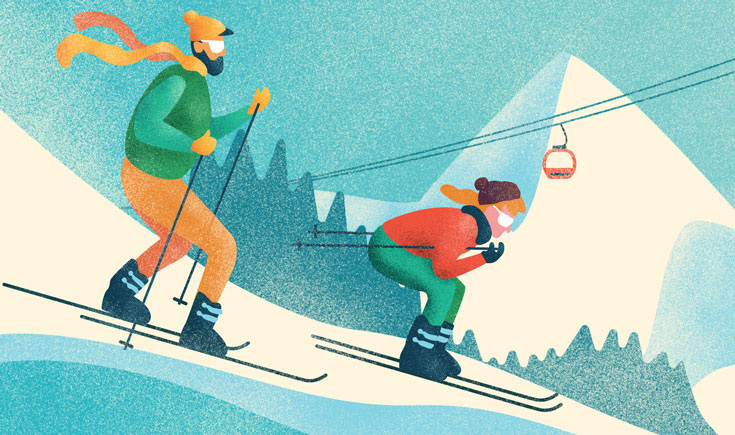
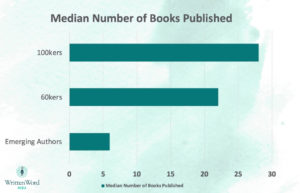
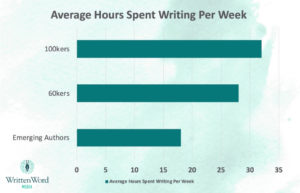
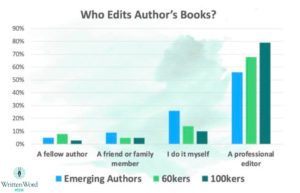
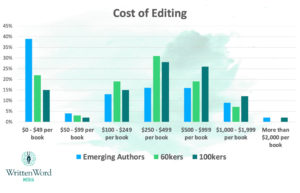
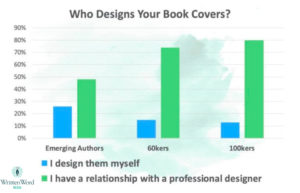
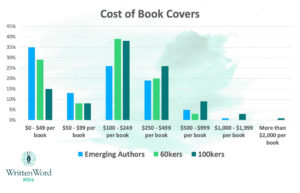
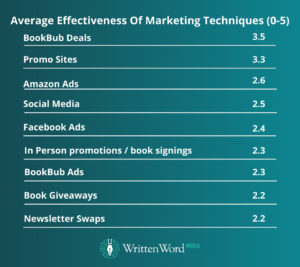
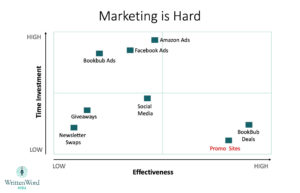
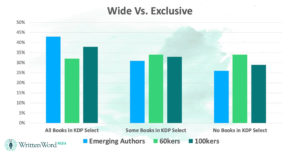
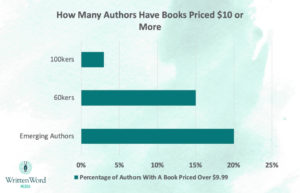
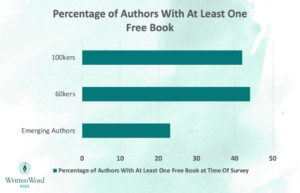
This is great data. Thanks for sharing
Thanks CB. We couldn’t do it without everyone who took the survey, so it’s truly a community effort!
More time to spend on writing. Of course. The 100kers CAN spend more time on writing because they don’t have a full-time job getting in the way. I already work 35 hours a week, so where would I find another 32 hours to write?
I’m not ranting, just stating the obvious.
Hey Pamela, yes that’s the hard part. For a lot of authors, spending more time writing won’t be a realistic option, and it will take more time to build up your catalog. I suspect that not every 100ker started out writing 30+ hours a week though.
That’s not true. I work a full time job (40 hrs) and make over $500k/yr. It’s dedicating a minimum word count per day. It’s doable.
That’s brilliant!
Thank You- I agree. I was a Div I athlete. baby steps. You pointed out “word count”. Your earnings speak volumes
It is very possible to work full time and find the time to write and publish enough books to be successful. As a former teacher/librarian, I did both for years.
Does this come with a price? Absolutely! It means less time for other activities. One must decide where priorities lie, and work toward them.
And BTW, great survey, thanks!
If you only work 35 hours a week, you can absolutely find another 32 hours to write. If you work 7 hours a day, 5 days a week, you could work 3 hours a day 15 days a week (15 hours) and another 10 hours a day on weekends (20 hours) for a total of 35 hours. It would be sacrificing personal time, but TOTALLY doable.
Just another author… and when do you live? According to your calcualtion, when you factor in that you need to eat, yield to your bodily functions, wash once in a while…. life’s just a succession of a working-writing-sleeping routine. And we have not yet mentioned that both a full-time job and writing require many extra hours apart from those actually spent on the job (commuting, career, problems to be solved, material issues…). And who does all your paperwork? (Bills, insurances, personal documents…). And then, though I know it’s optional, I personally chose to have children and also to devote to them all the time they need (a lot). Now, despite all this, I’m finishing my 3rd book, of which 2 have already been translated… and I enjoy writing! This is just to say that we all know it’s “TOTALLY” possible, and many of us are cheating Chronos everyday to get those books finished, even though we’re working “only” 35 hours on extremely demanding jobs… but I don’t think one can present it as if real life was as simple as a maths are.
That’s the first thing I thought. I’m trying my best to get more writing in, but my full time job is physically demanding and requires a resting period before I have the energy to write.
Get up 4 hours early on work days. You have a full day (10 hours) on Saturdays. Take Sundays off. That’s a 34 hour writing week. Tough to keep that going for a year, but then you can quit your job.
Haven’t heard any of the stories about people writing bestsellers with only an hour or less a day? (I think my favorite was the guy who was so ill, he could only muster enough energy to be interactive for about an hour a day, and still managed to get a book done in 9 mo.)
There are also many accounts of writers who got books written stuffing an hour or two around a 40+ hour a week job, only to discover they didn’t get any more writing done for quitting the job.
Painters will tell you that learning to paint is more about learning to see than learning to use the various tools of the trade–a lot of the painting happens before ever setting brush to canvas. Likewise, much of the creation of a book happens before the fingers start wiggling out the words of the book, and a lot of this can take place entirely in your head–even as you go about your paid tasks (especially if they’re boring and repetitive, like assembly work, of have fast and slow periods, like food service.)
As far as the use of professional editors and cover designers, that is a bit of a cart and horse situation. If I made 100k I wouldn’t want to design my own covers or do my own editing. I’d be building a team. But when you are on a budget, you have to get the books out there. It might be more useful to ask everyone how they did covers and editing BEFORE they were making big money.
Hey Ed, that’s a great point and I think we’ve hit on something we could ask in future surveys, or if any high earners want to chime in here. Before they were able to support themselves with writing, what did their practices look like when it comes to writing time, editing, or cover design?
I’m a high earner by your definition (I gross nicely, but as for net…) I quit the day job a year or so ago and my writing productivity actually dropped. I needed the time away from the WIP each day and week to get back to full imaginative compression, turns out. I also don’t have more than about 3000 words a day in me, on average, so 3-4 hours or so of high-compression writing is about all I can do. But at that rate, I can add four books and a novella or two to the my list each year. Even at 5000 words a week, you can still do a couple books and 2-3 novellas a year, which is a LOT of publishing.
I’m a ‘high earner’ by the current definition. Realizing the value of a quality cover, I saved up to enable to pay for a reputable designer in my genre, right from the start. The covers are what meant my books sold well to start with. In the early days, I trawled through Fiverr to find a good designer at an affordable price. I didn’t stop asking for edits until I knew it was perfect. Indies tend to rush publishing (because we know more books translate to more money), but cutting corners will limit your capacity to see the results reported here.
Amen Tamar! It’s backward to think you will sell your books to make enough money and THEN you can afford to invest in your product. So many emerging authors make this critical mistake. Just like any other business, you must be prepared to invest before you see serious returns. Yes, there are ways to bootstrap if you absolutely, unequivocally have to, but in my experience, it isn’t that dire a situation for most authors. They simply don’t want to invest the money before they see returns (or as Tamar noted, don’t want to wait while they save), and with that approach, they are never likely to.
This would be a good read and very helpful to those of us just starting out.
Reinvest the money you get back from your first books to pay for a professional edit and covers. Don’t spend the first money you get, build up your business
This is more of a Catch-22 scenario at least in terms of my path. I used stock imagery for a cover (big mistake) and self-edited (bigger mistake) my first couple of books. It makes it even that much more difficult to achieve sales when your cover isn’t catchy and your book is full of grammatical errors. Regardless, I continued to write and the more books I put out there the more sales I garnered, I then took that money and reinvested it back into the books to have them professionally edited and proper covers done. It was a long road and definitely not the get rich quick scheme many think writing is. The answer always seems to circle back to writing more. Not sure if that helped or not.
I’m an emerging author by the survey standards and this is what I’ve been doing. Like you did, I’m doing everything myself now while focusing on writing more, then planning to re-invest when I have more funds available later. Thankfully I have quite a bit of training in editing and design, so that helps, but I still believe in paying a professional to do the job better.
I see a lot of new emerging authors make the same mistakes, but a lot of them just give up. I’m really glad when I hear about author’s like you.
Great information, and I find it very encouraging. I guess I’d fit the definition of an emerging fiction writer, with my fourth book coming out in December. Nice to know others in my category aren’t averaging $100k — tells me I’m on the right path. I sort of wondered. I’ll just keep my head down and keep writing, my favorite activity.
Great to hear, Julie! Enjoy writing!
This is a great survey. Thanks so much for publishing it. Though I’m new in the game with my first novel to be published within a couple of months, the biggest surprise to me was how effective BookBub deals marketing was. Maybe it’s just me, but in my research on marketing strategies especially for newbies like myself, I’ve found little information on how to use this strategy. I wonder why that is?
You’re so welcome Wendy, and congratulations on the novel! BookBub deals can be hard to get as they are pretty selective in who they will feature, so that’s likely why you haven’t heard much about them (https://www.bookbub.com/partners/overview). We pride ourselves on getting great results for authors at all stages. But, one thing we try to do with our promo sites is give authors their “first-shot” as we accept a broader range of titles. Here’s a link to our booking system to learn more about our sites.
This is excellent info – will be sharing it with my friends in the industry!
I’d be curious to see more details on the income breakdown. “Under $60k” is a big category (I’m guessing it’s the majority of the respondents, but I’d be interested in knowing that too). How many in the emerging group are making $50 a year vs $500 vs. $5,000 vs. $50,000?
Still, that stat about the number of books is going to stick with me for sure. Thanks for compiling and sharing!
Thanks Molly! The under 60k bucket was the majority of respondents, and that’s a great idea to get more granular on how/ what they are doing. Something for the future!
Very interesting, thank you. With the editing some authors regard it as an integral part of the writing process and would prefer to do it themselves. Similarly with book covers. If you know your way around the software you can create a cover that looks professional. I have employed editors and graphic designers and discovered advantages and disadvantages during that process. If you are working to a budget, maybe that budget is better spent on book promotion?
I agree that writing more books is a good way to attract readers.
Interesting that not one method of book promotion stands out and that even the best methods have relatively low marks. I anticipated that at least one method would score four.
An observation: 95% of book promoters are American and they promote 95% of the time to America. That’s great, except most book promoters don’t grow their lists fast enough resulting in diminishing returns. I would love to promote more often with Freebooksy and BargainBooksy, but there is little point if my books are placed in front of the same people. (I know you are growing your lists, but I trust that you see my point).
With books priced at 0.99 it’s difficult for authors to make their money back on a promotion. This begs the question – is it better to garner sales through organic methods than to attract more readers at a small profit or financial loss?
There is a huge, untapped, market out there for authors and promoters. To reach that market authors need promoters to expand their horizons.
Hey Hannah, Thanks for your comment.
The main reason that so many promoters focus on the U.S. is it is still the largest market by far, so it provides the best proverbial bang for your buck. We do recognize that the international is growing, and we are looking at ways to help authors expand their reach outside the US.
It is true that many promotion sites don’t grow their audiences fast enough to provide consistent, replicable results to authors. We pride ourselves on being the outlier. We add over 10,000 readers to our lists every month, and we regularly see authors who have success promoting with us as often as every 30-60 days. Growing lists like this takes a lot of investment, so it’s easy to see why it’s not common, but we think it’s one of the things that sets us apart.
Lastly, the data shows that 100kers understand the lifetime value of acquiring a reader, so they don’t calculate the return solely on one 99c title. Rather, they look use a free or 99c title as a lead magnet that results in sales of their other titles. On the whole, the result is profitable. Garnering sales through organic means is always a good idea. The downside is that it can be slow going, so supplementing organic with other forms of marketing helps to accelerate the results.
Thanks again for your thoughtful feedback.
Many thanks for your interesting reply.
Thanks for doing this study. I found a lot of confirmation in it to what I’m experiencing in regards to number of books, exclusivity to Azon, and marketing effectiveness. What was the total number of responses to your survey?
Glad you found it interesting, Alec. We had about 1100 respondents.
Many of the respondents that are in the 100K realm have been around a while. Your information doesn’t speak to what once worked and what no longer works. In my experience, what works is constantly a moving target. In many survey’s I’ve seen from readers perspectives they have hundreds of free books in they’ve downloaded and will most likely never read. I think that while in the past that was viable, no longer is it still a way to get your name out. I would encourage you consider a way to capture information that speaks to what used to work and what doesn’t any longer.
That’s a great point and would certainly be an interesting survey to conduct. Talking about free promotions specifically, all the evidence does point to them still being a viable promotion technique. Even if some readers download and never read, you will still get some who do. Also, the additional downloads can help give some juice to the Amazon algorithm, leading to more exposure. Like all things digital marketing, it’s a numbers game.
I do wonder if there’s a correlation between who the happiest authors are, and those doing the most publishing. I love to write–just love it–but I think I was happier at it before I was published. Not sure how you’d survey something like that, but it would be an interesting discussion.
Hey Grace, that’s a really interesting question. It gets to the fact that everyone has different reasons for why they write, and different goals as well. I’m also not sure how to measure something like that, but I’m curious to hear more thoughts on this.
Hi Grace,
I’ve been in the position you describe. Keep on moving forward — there’s light at the end of that tunnel. Just refocus on WHY you love writing, don’t worry too much about the publishing, and work on your next book. In 2015, I realized I was taking all of the fun out of this side gig by worrying way too much about publishing and marketing. Instead, I now consider publication as the exclamation point at the end of all my labor of love. It’s the way I note something FINISHED in my mind and get to move on to the next thing I want to write. I do allow time for marketing again now, but honestly, I took a couple of years off from that and really re-evaluated what I wanted out of both this job and my day job. I found balance again, and the joy. You can, too. 🙂
J.R.
Thanks very much for this! I really appreciate it. It helps me to see what goals I need to be setting for myself.
I also want to thank you guys at Written Word Media for the great work you do. I’ve always gotten good results with Freebooksy and Bargain Booksy, and I appreciate the fact that you give opportunities to emerging authors too. Thanks again!
Thank you for the kind words Catherine. I’m glad you found the post helpful!
Thank you for the thoughtful survey! I survey 5-10,000 readers every year to get a sense of what is working, what promo techniques they respond to, and how much they’re willing to pay for books in certain genres. That’s at LitRing.com/about (in case those who were asking about the reader side of the equation want to check it out).
I also wanted to add that not enough people know how awesome BargainBooksy Featured Deal of the Day is! I have used it several times for both Mystery and Romance and, with the right book, it can be on par with a BookBub Featured Deal–though it costs way less. Thank you, and keep up the great work, guys!
Thanks Melissa! And thank you for including a resource for reader information. Very interesting!
Thanks Melissa – I’ll check out that link. I’m wanting to change my prices
Great article. It was good to see the comparison chart in advertising channels. Helps me to know that I am on the right track with advertising $$$ spend.
The comments section is rivaling the actual survey in knowledge nuggets!
Isn’t it!
I have two questions. Page count – Is there any difference in these groups on page count? Are they churning out 125 page romance books to get the book count up?
2nd is about non-fiction – I wonder if there is any difference in response for the non-fiction authors vs fiction.
Hey Randy, interesting questions. We didn’t gather page count data for this survey, but that would be an interesting thing to look at in the future. We did ask a genre question, but the way it was framed makes it hard to break out by income level and get reliable data (we didn’t have a specific angle for the blog post in mind when we wrote the survey). Another thing to consider in the future.
Very interesting survey. I write middle grade novels for kids. I have two traditionally published and three indies. Since my last novel was released, the 5th, I have noticed a modest increase in sales, so I do believe that the more in your catalog the better. I’ve found some success with Amazon ads and plan to continue to use them. I did try a Bargainbooksy ad some time back when I only had two books available, but I don’t think it did much at all for me. Maybe I should try again.
Great article. I would like to have seen a further breakdown on the prices everyone set for their books, rather than just a split at $10. I have heard there’s a dead zone, and a more detailed chart might show that.
This is really helpful & interesting stats. Thanks Written Word Media!
This is an insightful survey. As an emerging author. I saw that I was on the right track with just about everything. Amazon and Facebook ads are things you can experiment with and begin to master a bit while using promo sites as the main marketing tool until things change.
Not getting an editor and cover designer is a really bad idea. There are exceptions but they are few and far between. Especially the editing part. There are just things that you won’t catch. My process has my books going through four edits before they hit the market. I have two different cover designers and an illustrator. I love them all because it just frees up more time to write.
Thanks for your work here. It was helpful and encouraging.
Very interesting survey. Thank you. I consistently experience a sales drop during the months of Oct-Dec. I notice fellow authors in my chosen genre (post-apocalyptic) are currently doing some rock bottom pricing, so I assume they are experiencing the same thing. I realize a lot of popular books are published during the fall but for a future survey, perhaps authors could be asked which time of year produces their highest sales? Sluggish sales might be the same for everyone during the fall but I’m not sure. Cost of advertising could be adjusted accordingly. Thanks again.
Hey Clint, thanks for the comment. That would be a great thing to look at in future surveys. What time of year do authors see the most sales? And does it differ by genre?
I would like to see the numbers on marketing effectiveness split out between those in KU vs those who aren’t, i.e. wide. BookBub is useless if you never get one, and only a minuscule number of KU books are accepted. Also, it is well-known that AMS works much better for KU books.
Thank you for this information! I would love to see this broken down by genre and to also have a section that relates to audio books. Sadly this makes me wish Author Earnings was still publishing their reports.
Nice survey! I tried to participate but my answers never got their after multiple attempts (I heard there was a log jam). Anyway, I was surprised to see how many high earners sold there books for less than $10. Are those print books or e-books? I’m asking cuz it’d be hard for me to make much profit at $10 after production costs (design, layout and editing), printing cost, and distribution cost. Just wondering…
The fact of the matter is that almost all authors are being ripped off. Amazon, and other sites are selling your books and telling you that no books have sold. Everyone knows that the ONLY industry that will NOT tell you how many units have sold is the Book industry. I finally figured out a way to prove if books have sold, and when I showed other authors who were told NO BOOKS HAVE SOLD the authors used my tips and found hundreds if not thousands of their books selling”Used” You can’t have used paperback books unless they sold “New” first.
When those authors contacted Amazon and showed proof that their books were being sold Amazon Retaliated by deleting my 5-Star Review. That says it all! Why won’t any of them tell you how many books you have sold? Because they are ripping us off!
Good info! Bookmarking for future reference. With regards to pricing, is that ebook pricing only? Or does that also include print books? My print books are 9.99 but my ebooks are 2.99.
Hey Michael, Thanks for the comment. It’s eBook pricing.
Thanks so much for sharing! This is really good to know. I fall under the Emerging Author category and it’s good to know how much the number of books affects things. I only have two books out right now but I have been writing pretty consistently for the last year or so. I have the first draft of a third. I definitely think I’d have more but I have been doing the editing process by myself (I read through my books sentence by sentence backwards in order to check the typos and grammar) and I did one of the covers by myself too.
My thinking, and I don’t know how 60kers or 100kers feel about this, is that at least for book covers, I can get by with spending less on those initially, then whichever books get the strongest reviews and the most reader interest, I plan on splurging for really great covers for those in order to reach a wider market, and then also adding sequels.
An interesting article, but just one thing I’d like to point out. You can’t make a book permanently free on Amazon unless it’s wide because you can only make a book free on Amazon by price-matching it with other stores. This means that a free book can’t also be in KDP Select, so there are no earnings from KENP reads to be made from free books.
Hey Margarita, thanks for your comment. What we’re referencing in the post is you can either choose 5 free promo days or 5 Kindle Countdown Deals per 90 day period with KDP Select. During a free promo, if a reader in with a KU subscription downloads the eBook, you still get paid for reads.
Even going wide, you can’t make your book permanently free on Amazon. I had my first in a series free (through price matching) to garner sales for the other books. Amazon noticed how many copies were being downloaded for free and increased my prices WITHOUT telling me. I didn’t find out until I looked at my author page one day and saw that the price had been changed. When I contacted them about this, they essentially told me that they had the right to do whatever they wanted with my books on their platform, including randomly changing the price. I hate Amazon; they are super sleazy (in the way they treat their workers as well as indie authors), and I refuse to ever be exclusive with them. Authors need to stop being exclusive with Amazon and go wide to grow other platforms. Breaking Amazon’s monopoly is the only way we’ll get better treatment.
Clayton: To say that high earners have published 30+ books may be interesting, but this stat left me wanting more info. For example: (1) Are all their books in the same genre? (2) And what genre is that? (3) How long (word count), on average, are these books? (4) Are there series involved here or do the books all, or mostly, stand alone? These are just a few questions off the top of my head.
Also, the stat re hours spent writing made me wonder as well. You could spend 35 hours a week writing and produce 5,000 words or 50,000 words or even zero words. I’d be fascinated to know how many words/week the high earners are producing. Also, does time spent writing include outlining, writing marketing copy, revising, and a few other things I can’t think of at the moment? And are the high earners working alone or with a writing partner?
This isn’t to say that the study isn’t fascinating and useful. It’s both. Thanks for doing it. I’m hoping to see even more detailed info in the future.
This is a really interesting article, thank you. Luckily, I seem to be on the righ path. Although I’m still in the under $60K category, I’ve noticed a hike in sales at Book No 10. My 11th title is coming out next month.
Another interesting fact is the question of whether to stay exclusive with Amazon or ‘going wide’. I went wide last year and yet my income increased. However, I do think as a newbie it’s easier to start with KDP Select and when you have more than two titles out, go wide. (This is what I advice my coaching clients to do).
Also, having a free book and advertising that perma-free title in a regular basis is a good plan too. It drives sales to your back list during the months when you don’t have a new book out.
Great article and it really hammers home the idea that I need to stop wasting time on other things and just write. One thing I wonder about is the margin. The items that are investments in publishing (i.e. book covers, professional editors, etc.) all come with a cost. I would love to see the next survey ask about the authors margin. If they are making $100k+ a year does that mean they are making $100k+ after expenses or before? You could have someone making $100k a year running at a 50% margin (which is very good) and clearing $50k. You could also have a $60k author running at a %90 margin because they do everything themselves and they clear $54k. This is just an example, but I think you see my point.
Wonderful article. So many insights that will help. Do you have any intel on if the number of books in question one include box sets and anthologies? Or is pure novels?
Thanks Tikiri! This is self reported data, and we asked authors “how many books have you published?” It’s possible different authors took different things into account, but the overall data shouldn’t be skewed by that.
Another question is how many 60, 100ker authors use a pen name? Advisable? How much does this contribute to their profit? Thx
Whether it’s a pen name or your real name would only matter, I think, if your books are part of a larger strategy–seminars, one-on-one training, consulting, and the like. If you’re a one-genre author and nobody known your real name, anyway, it doesn’t make a lot of difference, though there’s some argument about certain names with certain genres (J.K. Rowling and S.E. Hinton were both advised by their publishing houses to not use their first names, because the books were both writing from the perspective of adolescent males, and adolescent males might be turned off by an obviously female author). From a profit perspective, the main argument seems to be using different names for different genres, so readers of one genre don’t get unpleasantly surprised to pick up their favorite author and end up with a genre they don’t like.
Thank you for the advice.
Thank you for gathering & publishing the survey as well as adding to comments. The business of writing is as complex as any other and its transforming. Things I’ve learned as a new author (1 book published, 2nd in editing)
– Make the best product you can afford – hire editors, designers, marketing copywriters
– Most all my friends don’t read my genre (archaeology thriller) or hardly read – readers are elusive & picky
– An industry exists selling how-to books to authors – limit your time & $ here, learn the basics and get to writing
– Take time away from writing when the fun slips away (assuming you have the means)
– Apply discipline to the business of writing if you intend to make a profit (aka build products people want, promote the products where people will buy them)
– Know why I like to write – because producing a book is WORK & I already have a lucrative day-job.
Please add your comments & thoughts
This is a fascinating and extremely helpful post with very valuable information for all authors. Well done! I just wanted to point out two weak spots that turn some of the well-intentioned and useful advice into misleading information.
Finding #3 does note that different types of editing are at different rates, but it’s irresponsible to simply advise that authors should “Be prepared to spend between $250 and $500 per book.” There is no chance you are paying that little for a developmental editor of any real experience or skill (on a full length book) at that range. It’s critical that when you discuss editing and expectations on prices that you differentiate between the types. They are not nearly the same, and authors are very confused on this point, so it really hurts the entire editing profession when bloggers give incomplete advice and therefore set incorrect expectations. For those reading this, check out the Editorial Freelancer’s Association Rate Chart for an actual idea of what you can expect to pay for various types of editorial (and other book related) services: https://www.the-efa.org/rates/
Finding #7 notes that the top earning authors don’t sell books for more than $5.99 compared to new authors who have books at $10 or more, but you don’t specify the format. There’s a huge difference between ebook pricing and paperback pricing these days, and while it’s increasingly common (and smart) for authors to keep their ebook prices as low as $0.99-$2.99 until they have an established audience, it is not smart to try and sell paperbacks at that price as they’d undoubtedly be losing a LOT of money on each sale and printing out of their own pockets.
Overall, lots of great insights here. Just maybe be a little more careful with the specifics. 😉 Thanks for sharing!
Thank you. I Couldn’t have put it more elegantly myself. I think this was a good article but it did miss somethings
I agree with you about the editing costs, Ally. $2,000 is extremely cheap to have a book edited. You might get one pass of copyediting or a line edit if you’re lucky. It certainly wouldn’t cover developmental editing or the full process of editing including the proofread. That’s why I’m hesitant to share this article, which is a shame because it has some good information in it.
I agree. This is my biggest question. How are folks getting books edited for $500 or less? I do a lot of developmental editing myself and just pay for a line edit and proofread, and it still comes in over a grand…
Professional services (editing and otherwise) is a circular argument. For authors making $100k+, outsourcing editing not only has a specialist doing what they do best, but frees the author up for more time to spend writing. Shoestring authors don’t have the money to spend on editing, so they have to take the time to do it themselves, which means they spend more time preparing each book–which leads to fewer books produced, which leads to a lower income (unless you get lucky and one of your titles knocks it out of the park). Same argument applies to layout and cover design.
I can’t count how many people I’ve sent to the first article (often with the summary “write more books.”) Now I have another to refer people to.
afriad…..
Spelling error from a copy editor. Lol.
Thank you for the info Delsan06@sympatico.ca
Very valuable info that repeats what I’ve already read, apart from the statistics. Writing for12 hrs straight is my unplanned record. I’m a Midwife & mother too. Some of us just pure & simple like to enjoy writing & the process of sharing our words. Learning by reading & experiencing is half the fun. I’m a self taught author of 2 books & (part)2 songs with so much to learn. So many folks advertise as they want to make money out of us by offering to ghost write or producing our books. Posts like these help us to find our own way & allow us to enjoy the process. Thank you.
This is a helpful article; however, the editing prices are extraordinarily cheap. I would be interested to know what these prices are based on as the editors I know certainly wouldn’t edit a manuscript for $2,000 or less.
This is really helpful. I’m gonna use this to write my new book, I can’t wait to finish it
I have got my first book out and working on second. For me me it is a great article with significant insights about everything. Thank you so much.
Loved this article. A reminder to not price books too high. And offer free books.
Paperbacks must necessarily high ($14) to make any money at all.
Thank you for this article. It was enlighten. Just what I was looking for.
Great data insights. Thanks for sharing.
I wonder if this survey still sticks true today, granting that we have the pandemic and an impending war, which will catapult prices soon. 😐
Michelle Kulp recommended this article in her book “Digital Retirement.” She also has a great training course, not very long as well.
These insights might help you concentrate your efforts, even if getting money from your writing is not your primary aim. These discoveries may be quite useful for authors who are trying to make a living from their writing. They can help you create objectives and figure out what works.